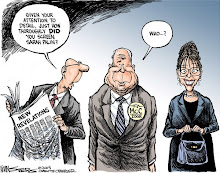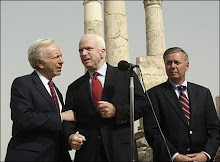By Michael D. Shear and Matthew MoskWashington Post Staff Writers Wednesday, March 12, 2008; Page A06
To show that he's a crusader against wasteful spending and congressional corruption, Sen. John McCain repeatedly brags about his leading role in stopping a scandal-plagued air tanker contract between the Air Force and Boeing in 2004. Four years later, a $35 billion contract has been awarded to Europe's Airbus consortium to build the latest generation of tanker planes. The decision has sparked anger from Boeing's congressional supporters and critics of outsourcing. It has also focused attention on McCain's reliance on lobbyists in his campaign for president because his finance chairman and several other top advisers lobbied for Airbus last year when it was in fierce competition with Boeing for the Air Force contract.
McCain has spoken out for years against the influence of special interests in Washington, but his campaign includes a number of prominent Washington lobbyists, including campaign manager Rick Davis, who founded a lobbying firm, and top political adviser, Charles R. Black Jr., chief executive of a well-known Washington firm. Neither of them lobbied for Airbus.
McCain finance chairman Thomas G. Loeffler and Susan E. Nelson, who left Loeffler's lobbying firm to be McCain's finance director, both began lobbying for Airburs's parent company in 2007, Senate records show. William L. Ball III, a former secretary of the Navy and frequent McCain surrogate on the trail, also lobbied for Airbus, as did John Green, who recently took a leave from Ogilvy Public Relations to serve as McCain's legislative liaison. "Airbus, I have to give them credit," said R. Thomas Buffenbarger, the president of the International Association of Machinists, which represents Boeing employees. "They know they need that kind of lobbying help. And they went after people who could deliver."
It is not clear what specifically the McCain campaign advisers did for Airbus. Lobbying registration documents list only "initiatives and interests regarding the KC-30 Aerial Refueling Tanker Program." Loeffler did not respond to e-mail requests for an interview.
McCain spokeswoman Jill Hazelbaker said the senator from Arizona and his advisers have done "nothing improper" in the tanker deal. "John McCain was never personally lobbied on this issue," she said.
Nonetheless, Democratic and Republican lawmakers in Washington state, where Boeing has long had a significant presence, have lambasted McCain for laying the groundwork for a decision that will cost their economy thousands of aerospace jobs. Lawmakers in Kansas, where Boeing has a plant, have also been critical.
On the campaign trail, McCain hails his involvement in the years-long search for a modern tanker as clear evidence of his commitment to rooting out special interests. In 2004, he led the congressional investigation that uncovered a bribery scandal in which top Boeing and Air Force officials went to prison or were forced to resign.
"I saved the taxpayers $6 billion in a bogus tanker deal," McCain said during a recent debate. But the easy applause line at his town hall meetings has become a much murkier issue for the presidential hopeful.
McCain has acknowledged sending two letters to Defense Department officials urging them to level the playing field for a deal that would provide a fleet of in-air refueling planes for military aircraft. In one 2006 letter, McCain urged officials to change their criteria for evaluating bidders for the tanker contract.
Nice work dude......send our MILITARY contracts to another country! Now THAT'S national security. Savings? We pay less for the inital sale but the taxes paid by the thousands who lost their jobs would pay more than the difference.....gee....you're RIGHT. You DON'T know anything about economics Maverick....
Tuesday, March 11, 2008
Subscribe to:
Post Comments (Atom)




No comments:
Post a Comment